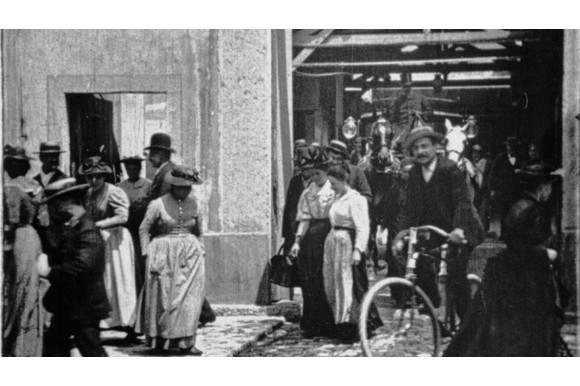FNE: Why did you decide to visit Katowice and the 4th International Festival of Producers?
Thierry Fremuax: Well firstly I couldn't pass on an invitation from Adam Pazera, but I always try to travel to places where I can find passion for film. Everybody needs to understand that the biggest film event like the Cannes Film Festival couldn't happen without these types of initiatives. They are especially important because they are activating the filmmakers not only on a national level, but on a regional level. This festival is organized by people who care about film, who want it visible and who want new productions to come to life. This is priceless in our industry because right now, even more than ever we need to work on building an audience.
FNE: Why is it so significant currently? Are the new forms of distribution like DVD and VOD endangering the system of screening in cinemas?
Thierry Fremuax: In the history of film and especially during my lifetime there was always something that was going to "kill the cinema" -- first there was television, then there was video, DVD and now VOD. The cinema will never be destroyed as a form of entertainment because it is the only place that brings us together and the viewers need that. What they also need is new and inventive initiatives that would help them enter into that experience. That is a challenge for the future.
FNE: What initiatives could help with the number of audiences increasing?
Thierry Fremuax: Festivals, which are focused on bringing what is important in cinema to the viewers all over the world, special screening, exhibitions -- anything that can get the viewers excited, help them to build a community. Within Europe we have a great chance to achieve that. That is why we need to stand together on the issue of cultural exception and that is why the new "Creative Europe" EU programme is so focused on these initiatives. The viewers want and need the experiences of going to the cinema, it is simple as that.
FNE: What are your criteria when you choose films for the Cannes IFF, a festival that certainly serves the purpose of educating the viewer about what is new in cinema?
Thierry Fremaux: It's not my job to say, "This is good and this is bad," or even to say, "I like this and I don't like that." It is my job to see what is out there, look at it closely and say, "Here, look, this is cinema right now." I, and my team, we try to find the most interesting, valuable works and put them in the programme. Each film whether it is in the International Competition or Certain Regard or another section is a title that we found important, a title that shouldn't be missed by the international audience.
FNE: Is there such a thing as a "Cannes film"?
Thierry Fremaux: No. In the end there is only the viewer sitting in a dark screening room and the film itself. It can be modern, experimental, formal, but it also can be a part of what we consider traditional or classical. It needs to be important, it needs to have great quality and it needs to say something about our reality. So I would say that any good film is a "Cannes" film.
FNE: what are the chances that a small, low budget production from Cent-Eastern Europe has of being a part of a programme in Cannes?
Thierry Fremaux: The chances are equal. Like I said, it is not about the territory or the person of the filmmaker, in the end it is always about the film. In 2007 a Romanian filmmaker Cristian Mungiu was practically unknown and he was invited to Cannes with his second film. I believed in him, at the time it was a certain gamble that I took and it paid off; he won. If the picture is good, there are no limits.
FNE: Romanian cinema has been having a tough time these last few of years, but the Romanian filmmakers are often recognized at big, international film events. Do you see any other countries from the region that might be "on the rise"?
Thierry Fremaux: Of course I can't choose any country in particular, because we never know what the next year will bring. I think we are getting closer and closer to the point where it really won't matter where the film and the filmmaker are from. What I can say is that the countries from the Cent-Eastern European region have a great cinematic tradition and their most recent development proves that good work can surpass any circumstances.




















